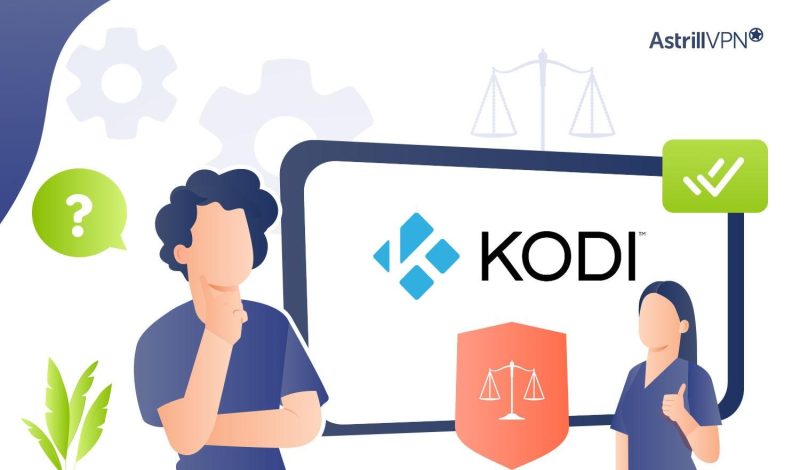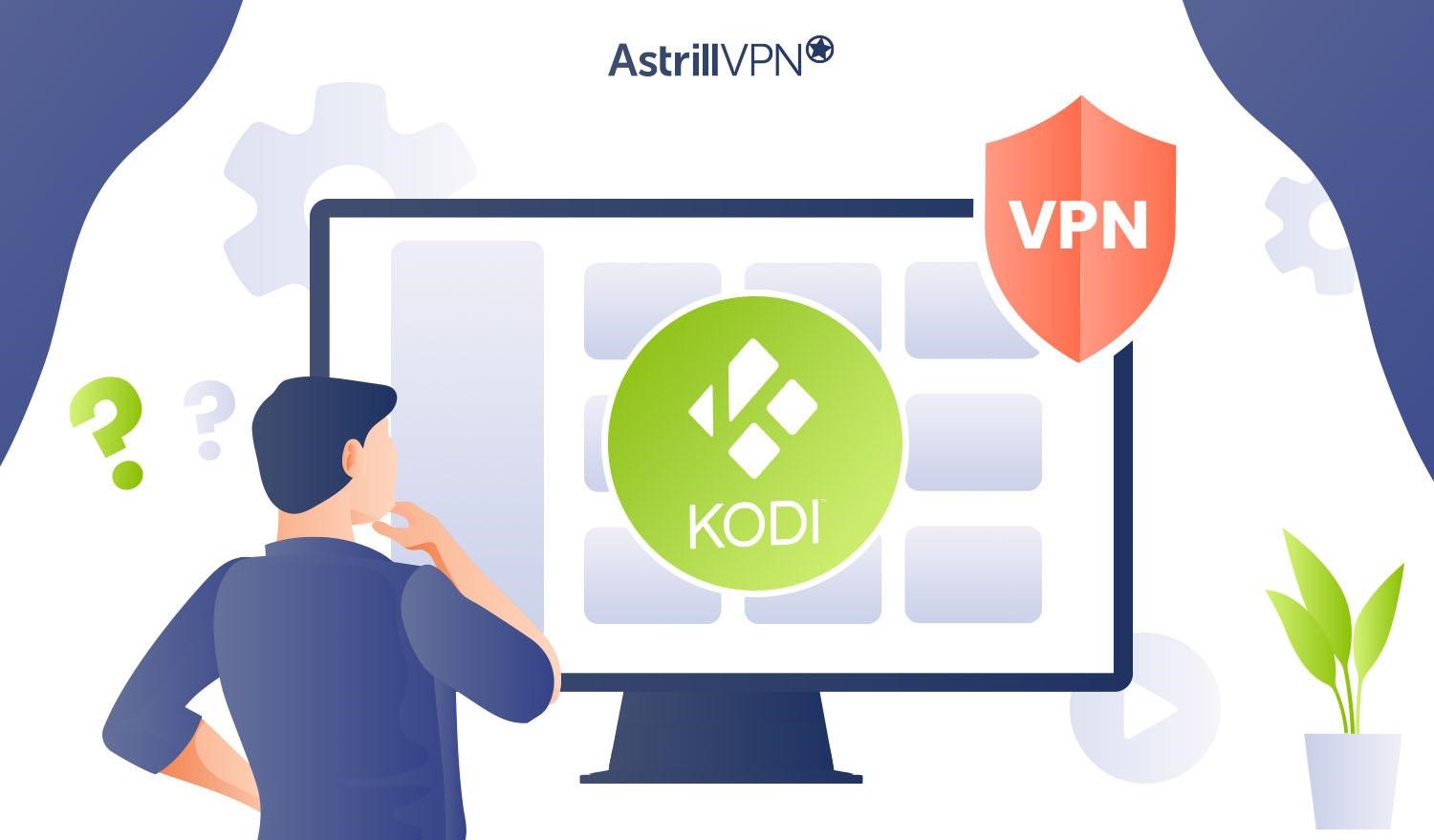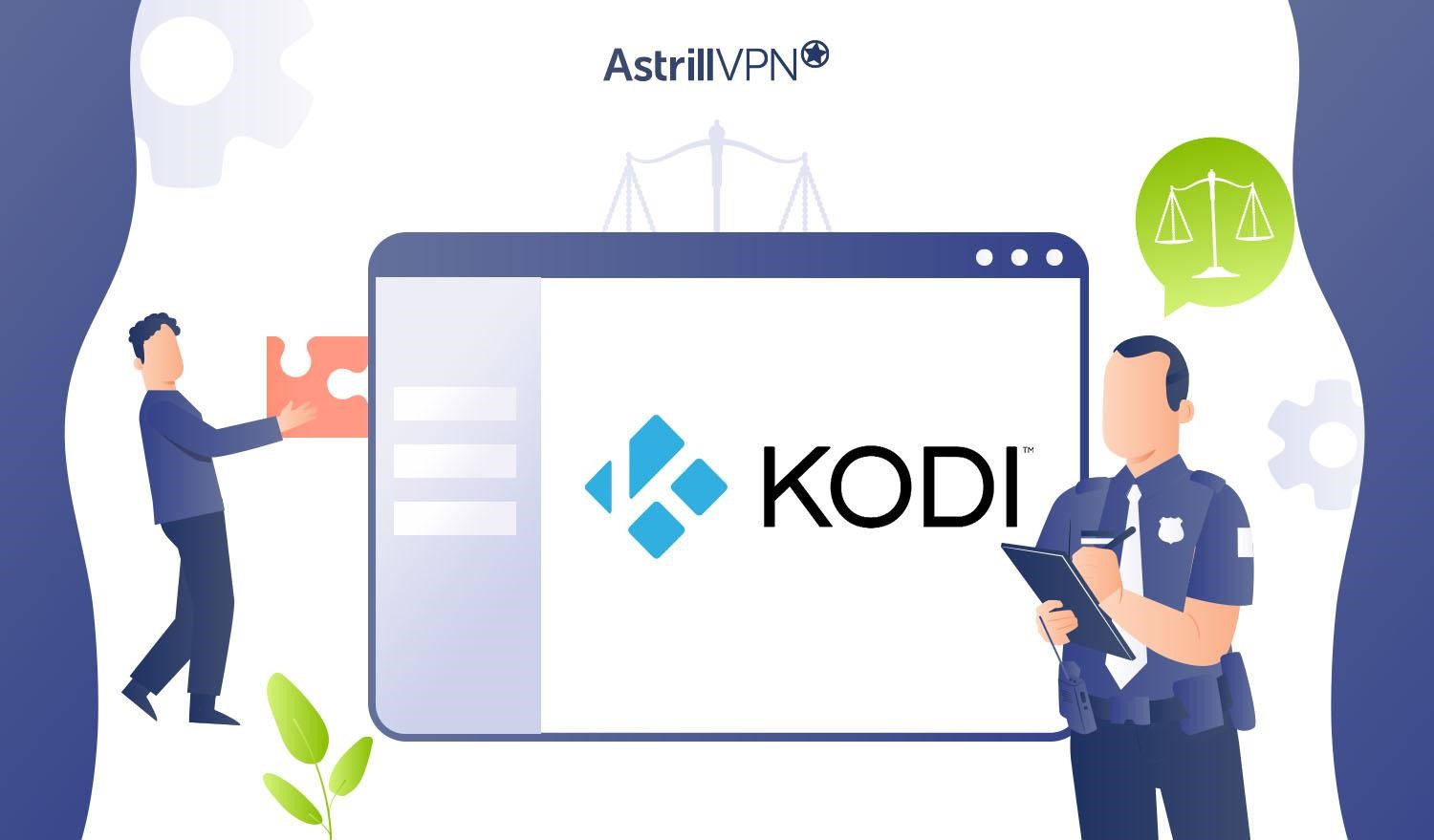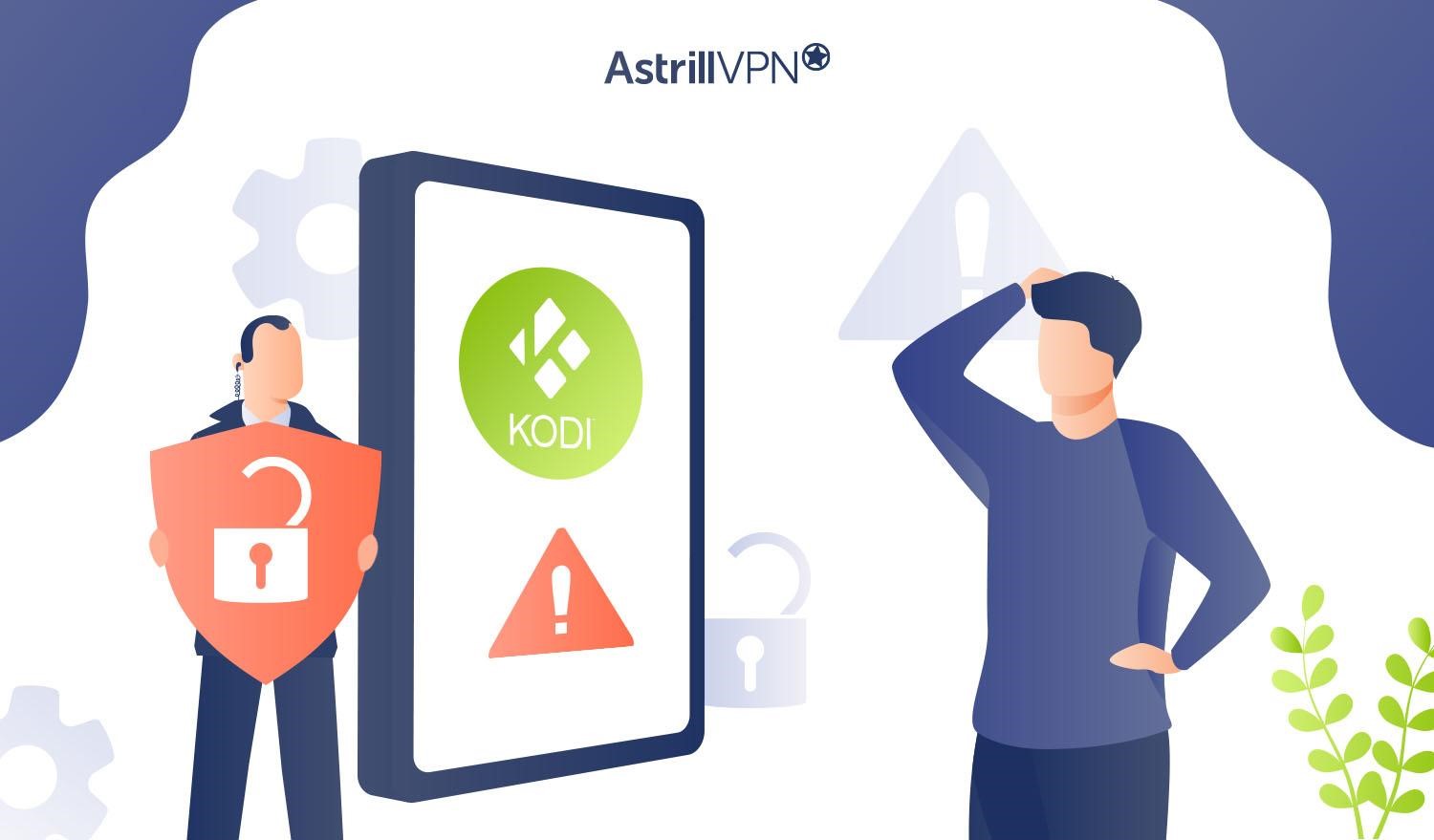Is Kodi Safe and Legal? Everything You Need to Know Before You Start Using It

Arsalan Rathore

Kodi is a robust and flexible media player that opens up a world of possibilities for movie and television buffs in an age where online streaming has become a vital part of our entertainment landscape.
However, this level of influence comes with consequences. Kodi’s extensive ecosystem of third-party add-ons, repositories, and customization tools provides users with a wide range of entertainment alternatives but also opens them up to potential security threats and legal problems.
If you’re new to Kodi and want to learn how to get the most out of it or an advanced user who wants to ensure you’re always in compliance with the law, this guide is undoubtedly for you.
Table of Contents
What Is Kodi?
Kodi, formerly known as XBMC (Xbox Media Center), is a versatile, open-source media player and entertainment hub that has gained immense popularity among media enthusiasts. It is a software application designed to serve as a central platform for managing and playing your media content, including movies, TV shows, photos, etc.
Is Kodi Safe?
Kodi itself is considered safe to use for its intended purpose as a media player and content management platform. It is open-source software developed and maintained by a community of volunteers. When you download Kodi from the official website and use it for managing your personal media library, it poses no inherent safety or security risks.
Should I Use Kodi?
The decision to use Kodi largely depends on your entertainment needs and preferences. Kodi can be a fantastic choice if you want a centralized platform to manage and enjoy your media collection. Here are some key reasons why you might consider using Kodi:
- Customization: Kodi is highly customizable, allowing you to tailor the interface, add-ons, and skins to your liking. This level of flexibility enables you to create a personalized media center that suits your specific needs.
- Multi-Platform Compatibility: Kodi supports many operating systems, making it accessible on almost any device. Whether you’re using Windows, macOS, Linux, Android, iOS, or even a smart TV, you can install Kodi.
- Media Management: Kodi’s robust media library management system helps you easily organize and access your files. It automatically scrapes metadata, including movie posters and TV show information, to make your content visually appealing and easily searchable.
- Kodi Add-Ons: Kodi’s extensive library of add-ons enhances its functionality. You can use add-ons to access online streaming services, live TV, sports, music, and more. These add-ons enrich your entertainment options.
- Community Support: The Kodi community is vast and active. If you encounter Kodi working issues or have questions, you can find assistance on forums and support channels.
Is Kodi Legal?
Kodi itself is entirely legal software. It is an open-source project developed to provide users with a legitimate means of managing and enjoying their media libraries. Using Kodi to organize and play your locally stored media is unquestionably legal.
The potential legal concerns associated with Kodi arise when users venture into the realm of third-party add-ons and repositories. While Kodi is not responsible for the content these add-ons provide, some users may choose to install and use add-ons that access copyrighted or pirated content without proper authorization. This is where the legal gray area exists, and all Kodi users should know it.
It is crucial to understand that copyright laws vary by country, and the legality of streaming or downloading copyrighted content differs worldwide. While some countries may have more lenient policies, others enforce strict copyright regulations.
To ensure you are using Kodi legally, follow these guidelines:
- Stick to Official Add-Ons: Kodi offers a selection of official add-ons compliant with copyright regulations and legal content distribution.
- Respect Copyright Laws: Avoid using third-party add-ons that provide access to copyrighted material without the necessary permissions. Engaging in piracy can lead to legal consequences.
- Use a VPN: If you are concerned about online privacy and security, consider using a VPN to protect your identity and data when streaming or downloading content.
Why You Need a VPN for Kodi

Using a VPN with Kodi is a smart choice for several reasons. While Kodi is a legal and open-source media player, third-party add-ons can sometimes enter into a legal gray area. Here’s why you might need a VPN when using Kodi:
1. Privacy and Security
Kodi users often access content from various sources, including third-party add-ons and streaming services. Your internet traffic is exposed without a VPN, enabling your ISP, government agencies, or hackers to monitor your online activities.
A VPN encrypts your internet connection, creating a secure and private tunnel for your data to pass through. This means your online activities, like the content you stream on Kodi, remain confidential and inaccessible to prying eyes.
2. Geo-Restrictions
Many streaming services and websites enforce geo-restrictions, limiting content access to specific regions. A VPN lets you connect to servers in different countries, effectively “changing” your virtual location.
This allows you to bypass these geo-restrictions and access content as if in a different region. For Kodi users who want to enjoy content from around the world, a VPN is an invaluable tool.
3. Anonymity
Your IP address is a unique identifier that can reveal your location and identity. A VPN masks your actual IP address with that of the VPN server you connect to. This hides your real identity and makes it challenging for anyone to trace your online activities back to you.
Anonymity is crucial, especially when using Kodi to stream content from various sources, some of which may have questionable legality.
4. Preventing Throttling
Some ISPs throttle or intentionally slow down internet connections when they detect high data usage. This can lead to buffering issues and decreased streaming quality, frustrating Kodi users.
When you use a VPN, your ISP cannot easily detect the type of data you’re transmitting, making it less likely for them to throttle your connection. This ensures smoother streaming experiences, even when consuming large amounts of data.
5. Accessing Kodi Safely
Using Kodi for legitimate purposes, such as managing your media library, is entirely legal. However, third-party add-ons can introduce legal uncertainties, as these add-ons might provide access to copyrighted content without proper authorization.
Using a VPN for kodi adds an extra layer of security to your online activities. This helps protect you from potential legal issues and ensures your privacy remains intact.
Are Kodi and third-party add-ons legal?
Third-party add-ons make the situation more complex. These add-ons, developed by both the Kodi community and independent developers, can extend Kodi’s core functionality and provide access to additional features, including streaming services, media libraries, and live television.
1. Legal Add-Ons
Many third-party add-ons are legal and function within the bounds of copyright law. These add-ons may provide access to content from legitimate sources, such as streaming services with which they have agreements. Examples of legal add-ons include:
- YouTube: Allows users to watch YouTube videos.
- Netflix: Streams content from Netflix with a valid subscription.
- Twitch: Provides access to Twitch streams.
These add-ons comply with the terms of service of the platforms they interact with and do not distribute copyrighted content without permission.
2. Illegal Add-Ons
The legal issues arise with add-ons that offer access to copyrighted content without proper authorization. Some third-party add-ons, often referred to as “pirate” or “illegal” add-ons, facilitate the streaming or downloading of copyrighted material without the consent of the content creators or rights holders. These add-ons can provide access to:
- Movies: Recent releases or popular films without proper licensing.
- TV Shows: Episodes from various networks or services without authorization.
- Sports Events: Live sports broadcasts or pay-per-view events.
The legality of Kodi and third-party add-ons varies from country to country. Here’s an overview of the legal status of Kodi and third-party add-ons in different regions:
1. United States
The crackdown on illegal Kodi add-ons in the United States has been vigorous and multi-faceted. The Alliance for Creativity and Entertainment (ACE), a coalition including major studios like Disney, Netflix, and Warner Bros., has been at the forefront of legal actions.
ACE has targeted both individuals and organizations distributing illegal add-ons. In 2018, ACE won a significant legal victory against several high-profile illegal add-on developers, resulting in substantial financial penalties and court orders to cease operations.
U.S. authorities have conducted numerous raids and seizures of illegal streaming devices and add-ons. In early 2021, the Department of Justice (DOJ) announced the seizure of more than 200,000 illegal streaming devices and add-ons in a coordinated operation.
ISPs in the U.S. are increasingly cooperating with content creators to identify and block access to illegal streaming sites. In some cases, ISPs have received court orders to block specific domains associated with illegal Kodi add-ons.
According to ACE, as of 2023, over 1,000 websites and 200 repositories offering illegal Kodi add-ons have been shut down or blocked in the U.S. Piracy’s financial impact on the U.S. film and TV industry is estimated to be in the billions annually.
2. United Kingdom
The United Kingdom has taken significant steps to combat illegal Kodi add-ons and streaming devices. The UK High Court has issued several orders mandating ISPs block access to websites that distribute illegal Kodi add-ons. In a notable case in 2019, the court ordered BT, Sky, and other ISPs to block access to pirate streaming sites.
The UK has pursued criminal prosecutions against individuals involved in selling and distributing illegal Kodi add-ons. For instance, in 2020, a man was sentenced to prison for selling devices pre-loaded with illegal streaming add-ons, receiving a 12-month prison sentence and a substantial fine.
The Intellectual Property Office (IPO) has launched public awareness campaigns about the risks of using illegal add-ons. The “Get It Right” campaign aims to educate consumers about legal alternatives and the risks associated with piracy.
According to the IPO, over 50% of UK households have been exposed to illegal streaming content. The UK government has estimated that piracy costs the UK film and TV industry over £1 billion annually.
3. Canada
Canada has also taken measures to address the use of illegal Kodi add-ons. Canadian authorities, including the Canadian Motion Picture Distributors Association (CMPDA), have filed lawsuits against distributors of illegal streaming devices and add-ons. In 2020, a landmark case awarded significant damages to content creators.
Canadian ISPs are working with industry groups to block access to sites offering illegal add-ons. The Canadian Radio-television and Telecommunications Commission (CRTC) has tackled illegal streaming by issuing notices to ISPs about the importance of blocking pirate sites.
Canadian organizations are running campaigns to inform the public about the legal implications of using pirated content and to promote legal streaming services.
The CMPDA reports that piracy and illegal streaming cost the Canadian film and TV industry approximately CAD 500 million annually. Additionally, a 2023 survey found that 35% of Canadians use streaming services with some form of piracy.
4. Australia
Australia has seen increased regulatory and legal actions against illegal Kodi add-ons. In 2021, the Australian Federal Court issued orders blocking access to websites distributing illegal Kodi add-ons. The Australian Communications and Media Authority (ACMA) has been instrumental in ensuring compliance among ISPs.
Australian authorities have prosecuted individuals involved in the sale of illegal streaming devices. In one notable case, a man was fined AUD 15,000 and ordered to cease selling devices pre-loaded with illegal add-ons.
The Australian government and industry groups are running campaigns to educate consumers about the legal risks of using pirated content and to promote legitimate streaming options.
The Australian film and TV industry estimates that piracy costs the sector around AUD 1 billion annually. A 2022 report indicated that over 40% of Australians access pirated content at least once a month.
5. Germany
German courts have issued rulings against distributors of illegal streaming devices and add-ons. In 2022, a German court fined a prominent seller of illegal Kodi add-ons €500,000 and ordered the shutdown of related websites.
German authorities have worked with ISPs to block access to pirate streaming sites. The Federation of German Consumer Organizations (vzbv) has actively pushed for stricter measures against illegal content distribution.
The German film and TV industry reports that piracy costs approximately €600 million annually. Studies indicate that 30% of German internet users have accessed pirated content in the past year.
6. France
France has been proactive in tackling the issue of illegal Kodi add-ons through various legal and regulatory measures. France has stringent copyright laws under the Hadopi (Haute Autorité pour la diffusion des œuvres et la protection des droits sur Internet) law. This law enables authorities to pursue legal action against individuals and entities distributing illegal content.
In 2022, French courts issued injunctions against websites and online platforms offering illegal Kodi add-ons. The French anti-piracy organization ALPA (Association de Lutte contre la Piraterie Audiovisuelle) actively pursues legal action against illegal streaming services.
French ISPs are mandated to block access to websites distributing illegal add-ons. The ARCOM (Autorité de régulation de la communication audiovisuelle et numérique), the French regulatory body, oversees this enforcement.
The French film and TV industry estimates that piracy results in a loss of approximately €800 million annually. Reports from 2023 indicate that around 25% of French internet users have accessed pirated content.
7. Italy
Italy has taken significant steps to combat the distribution and use of illegal Kodi add-ons.Italy’s AGCOM (Autorità per le Garanzie nelle Comunicazioni) regulates and monitors the media sector, including combating illegal streaming. AGCOM issues orders to block access to pirate sites.
Italian authorities have pursued criminal cases against distributors of illegal streaming devices. In 2021, Italian police seized thousands of illegal devices and add-ons in a nationwide crackdown.
Italy has launched educational campaigns to inform the public about the risks of using illegal add-ons and promote legal streaming services. According to the Italian Association of Audiovisual and Multimedia Entertainment (AEA), piracy costs the Italian entertainment industry approximately €500 million annually. Surveys indicate that 30% of Italians use illegal streaming services.
8. Spain
The Spanish National Police has conducted several operations against selling and distributing illegal streaming devices. In 2022, police arrested multiple individuals involved in distributing Kodi add-ons that provided access to copyrighted content.
Spanish courts have issued orders to block websites and online services that distribute illegal Kodi add-ons. The Spanish Copyright Society (SGAE) actively participates in these legal actions.
ISPs in Spain must block access to sites distributing illegal content as part of their compliance with anti-piracy regulations. The Spanish film and TV industry reports losses of around €600 million annually due to piracy. Approximately 28% of Spanish internet users have accessed pirated content.
9. Netherlands
Dutch copyright laws are enforced under the Dutch Copyright Act. Authorities take legal action against the distribution of devices and add-ons that facilitate piracy. In recent years, Dutch courts have issued several rulings to block websites and services distributing illegal Kodi add-ons. The Dutch Anti-Piracy Foundation (Stichting BREIN) is actively involved in these efforts.
Dutch ISPs must block access to pirate sites and comply with court orders related to anti-piracy measures. The Dutch film industry estimates losses of approximately €400 million annually due to piracy. Reports suggest that around 22% of Dutch internet users access pirated content.
10. New Zealand
New Zealand’s Film and Video Labelling Act regulates and monitors film and video content distribution, including illegal streaming devices. The Copyright Compliance Agency (CCANZ) has pursued legal actions against individuals and entities in distributing illegal Kodi add-ons. In 2022, New Zealand authorities seized several thousand devices in a major crackdown.
The New Zealand government and industry groups run campaigns to educate the public about the risks of using pirated content and to promote legal streaming options. The New Zealand film and TV industry estimates that piracy results in approximately NZD 150 million losses annually. Surveys indicate about 18% of New Zealand internet users engage with pirated content.

TVAddons, Fusion, and legal alternatives
TVAddons and Fusion were once popular repositories for Kodi add-ons, offering a diverse range of third-party extensions. However, due to their involvement in hosting add-ons that provided access to copyrighted content without proper authorization, TVAddons and Fusion faced legal challenges.
Consequently, they have significantly reduced their offerings and faced legal action in various jurisdictions.
For Kodi users seeking legal alternatives to third-party add-ons, several official Kodi repositories and add-ons adhere to copyright regulations and offer a wide variety of content. Here are some noteworthy legal Kodi add-ons:
1. YouTube
The official YouTube add-on provides access to an extensive library of user-generated content, including music videos, tutorials, vlogs, and more. As one of the most popular streaming platforms, YouTube offers a wide array of content, all within the bounds of copyright law.
2. Tubi TV
Tubi TV is a legal, ad-supported streaming service offering diverse movies and TV shows. With Tubi TV’s official Kodi add-on, you can enjoy various genres and content while adhering to copyright regulations.
3. Crunchyroll
For anime enthusiasts, Crunchyroll offers a vast selection of officially licensed anime and manga content. The Crunchyroll Kodi add-on is the perfect way to access this content legally and support the anime industry.
4. BBC iPlayer
If you’re in the United Kingdom, the official BBC iPlayer add-on grants you access to a treasure trove of BBC’s TV and radio content. It’s a legal way to enjoy British programming and catch up on the latest shows.
Security Concerns with Kodi?

Kodi is a powerful media player and content management platform, but like any software, it has security concerns. Understanding and addressing these concerns is essential for a safe and enjoyable Kodi experience. Here are some of the critical security issues associated with Kodi:
Man-in-the-middle attacks
Man-in-the-middle (MITM) attacks are a potential risk when using Kodi, especially if downloading and installing Kodi builds, add-ons, or repositories from unofficial sources. In an MITM attack, an attacker intercepts communication between your Kodi installation and the add-on or repository server.
It can allow the attacker to inject malicious code or capture your data, compromising privacy and security.
To mitigate MITM attacks, always download add-ons and repositories from reputable sources and use encrypted connections when possible. Consider using AstrillVPN to encrypt your internet traffic, making it more challenging for attackers to intercept and manipulate your data.
Malicious add-ons
One of Kodi’s most significant security concerns is using malicious add-ons. While the official Kodi repository offers many safe and legitimate add-ons, some third-party repositories may host add-ons that contain malware or collect user data without consent. These add-ons can pose serious security risks, including privacy breaches.
To protect yourself from malicious add-ons:
- Stick to the official Kodi repository and well-known, trusted sources for add-ons.
- Regularly review the permissions requested by add-ons and be cautious if they request excessive access to your system.
- Keep your Kodi installation and add-ons updated, as developers often release security updates.
Devices with Kodi pre-installed
Some pre-configured devices or “fully loaded” Kodi boxes have add-ons and repositories that facilitate access to copyrighted content without proper authorization. These devices may be illegal in many regions and pose security risks. Pre-installed Kodi devices may contain hidden malware, and their sources are often unverified.
It’s best to purchase a reputable, blank device and install Kodi from the official website. This ensures complete control over the content and add-ons you install, reducing security risks associated with pre-configured devices.
ISP snooping
Your internet service provider (ISP) can monitor your online activities, including using Kodi. While using Kodi for legitimate purposes is entirely legal, ISPs may throttle your internet connection if they detect excessive data usage. This can lead to buffering and slower streaming experiences.
To prevent ISP snooping and throttling, consider using a VPN. AstrillVPN encrypts your internet traffic and hides your activities from your ISP, ensuring a smoother and more private Kodi experience.
Crackdown on Kodi and Fully Loaded Kodi Boxes Users
An operation in the United Kingdom in 2021 was aimed at illegal TV streaming, clearly showing that piracy is a serious crime. As part of this nationwide crackdown, cease and desist notices were issued to individuals suspected of providing illicit streaming services. The operation targeted properties in several regions, including Essex, Hertfordshire, West Yorkshire, and Pembrokeshire, underscoring the widespread nature of the issue.
The focus of these actions was on devices like IPTV (Internet Protocol Television) and Kodi boxes, which have gained popularity in recent years for their ability to enable users to stream premium TV content, including services like Netflix and live sports, often at a fraction of the cost of legitimate subscriptions.
Kieron Sharp, Chief Executive of the Federation Against Copyright Theft (FACT), stressed the gravity of the situation. He emphasized that piracy constitutes fraud, and those seeking financial gain through such activities should be aware that law enforcement agencies are taking their actions seriously.
The crackdown came after a series of enforcement actions against individuals and businesses distributing these devices. One notable case from Teesside in 2017 involved Brian Thompson, a Kodi box trader, who faced legal consequences for selling these devices from his store, Cutprice Tomo’s TVs, located on Parliament Road.
The efforts to combat illegal TV streaming reflect the commitment of authorities to uphold copyright laws and protect the interests of content creators and rights holders.
Is Kodi completely free?
Kodi is an open-source and free media player software, meaning that the core Kodi software is entirely free to download and use. It is developed by a community of volunteers and distributed under an open-source license.
However, it’s important to note that while Kodi itself is free, the cost of using it may come from other sources. Here are some aspects to consider:
1. Add-Ons
Many add-ons and plugins for Kodi are also free, and they extend the functionality of Kodi by providing access to various types of content. However, some add-ons may require subscriptions or have premium features that come with a cost.
2. Content
The cost of content is separate from Kodi itself. For example, if you purchase or rent movies or subscribe to streaming services, you’ll incur charges associated with the content you access through Kodi.
3. Hardware
While the Kodi software is free, you’ll need compatible hardware to run it. This can include a computer, smartphone, or dedicated media center device. The cost of the hardware depends on your preferences and requirements.
FAQs
Kodi is a safe media player, but its safety depends on how you use it. Beware of third-party add-ons and repositories, as some may contain security vulnerabilities.
Kodi remains a top choice for media management and customization. Its reputation as the best depends on individual preferences and needs.
Kodi and VLC serve different purposes, as Kodi is a media center for organizing and streaming content, while VLC is primarily a media player.
Using a VPN with Kodi is advisable, especially if you stream content from third-party add-ons or want to enhance privacy and security.
The legality of Kodi in the UAE is unclear. While the core Kodi software is legal, using third-party add-ons for copyrighted content can be problematic. Users in the UAE should exercise caution and consider the legal implications.
Kodi is an open-source project without a single owner. It is managed by the XBMC Foundation, a non-profit organization, and its development and maintenance involve a community of volunteers worldwide.

No comments were posted yet